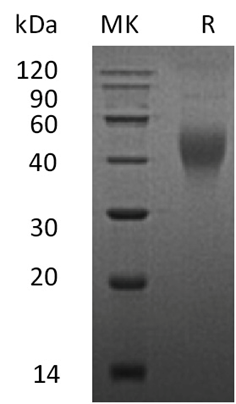#CB34, Recombinant Mouse M-CSF
Recombinant Mouse Macrophage Colony-Stimulating Factor 1 is produced by our Mammalian expression system and the target gene encoding Lys33-Glu262 is expressed.
- Accession: P07141
- https://www.uniprot.org/uniprotkb/P07141
- Known As: Macrophage colony-stimulating factor 1; CSF-1; MCSF; Csf1; Csfm
- Mol Mass: 26 KDa
- APMol Mass: 37-80 KDa, reducing conditions
- Formulation Description: Lyophilized from a 0.2 μm filtered solution of PBS, pH 7.4.
- Endotoxin: Less than 0.001 ng/µg (0.01 EU/µg) as determined by LAL test.
- Purity

- Reconstitution
It is not recommended to reconstitute to a concentration less than 100μg/ml.
Dissolve the lyophilized protein in distilled water.
Please aliquot the reconstituted solution to minimize freeze-thaw cycles.
- Storage
Lyophilized protein should be stored at < -20°C, though stable at room temperature for 3 weeks.
Reconstituted protein solution can be stored at 4-7°C for 2-7 days.
Aliquots of reconstituted samples are stable at < -20°C for 3 months.
- Shipping
The product is shipped at ambient temperature.
Upon receipt, store it immediately at the temperature listed below.
- Background
Macrophage colony-stimulating factor 1(M-csf)is a single-pass type I membrane protein . It is a hematopoietic growth factor that is involved in the proliferation, differentiation, and survival of monocytes, macrophages, and bone marrow progenitor cells. M-CSF affects macrophages and monocytes in several ways, including stimulating increased phagocytic and chemotactic activity, and increased tumour cell cytotoxicity. The role of M-CSF is not only restricted to the monocyte/macrophage cell lineage. By interacting with its membrane receptor, M-CSF also modulates the proliferation of earlier hematopoietic progenitors and influence numerous physiological processes involved in immunology, metabolism, fertility and pregnancy.
For Research or Manufacturing Use Only, Not for Use in Diagnostic or Therapeutic Procedures.

